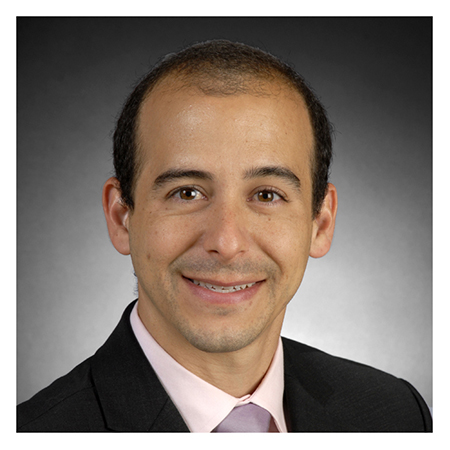Toward Best Practices for Tracheostomy Patients

Tracheostomy is a common procedure performed in acute care hospitals for patients who require long-term ventilation, have a need for continued pulmonary hygiene, or to bypass an upper-airway obstruction and safely deliver oxygen to the lungs. While tracheostomy saves lives, it also puts patients at risk for increased morbidity, complications during a hospital stay, and death.
Years ago, after two of his tracheostomy patients had poor outcomes, Ibrahim “Trey” Alava III, MD, developed a passion for improving care for these high-risk patients. “It was my second year of practice, and I was naïve about how complex health care systems are and how effective communication between physicians, nurses, and other patient care professionals can be so important,” says Dr. Alava, associate professor and vice chair for quality in the Department of Otorhinolaryngology at McGovern Medical School at UTHealth Houston and chief of otolaryngology-head and neck surgery at Lyndon B. Johnson Hospital, part of Harris Health System. “When I reviewed the two cases in depth, I found that we failed those patients in multiple areas. All of us had the same goal – to provide exceptional care – and we were doing that well, but there was poor awareness of the high risk of morbidity and mortality in these patients and lack of understanding about how quickly their condition could worsen.”
Dr. Alava researched the medical literature and sought guidance from colleagues and mentors. “I wanted to revamp everything we were doing for our tracheostomy patients from A to Z and create a foundational care plan that would lower their risk and improve their outcomes,” he says. “In talking with the anesthesiologists and other members of our team, we saw that we didn’t have built-in redundancies that would ensure good outcomes. As we dug deeper, we found that what we were doing was akin to flying an airplane with one engine and no copilot. You might be able to do that for a while, but if you have another problem, you’re in trouble.”
Dr. Alava worked with Omonele Nwokolo, MD, associate professor in the Department of Anesthesiology at McGovern Medical School, director of operating rooms at Memorial Hermann-Texas Medical Center, and assistant operating room director at LBJ Hospital, to develop an airway algorithm for tracheostomy patients. As they moved toward publication of their findings, they discovered that David Hernandez, MD, assistant professor of otolaryngology at Baylor College of Medicine and chief of service at Ben Taub General Hospital, also part of Harris Health System, faced similar problems with laryngectomy patients. The result was an all-encompassing patient safety initiative involving Harris Health System and Memorial Hermann that resulted in a revamp of care for tracheostomy and laryngectomy patients.
Begun at Ben Taub in 2018, the initiative required the buy-in and participation of multiple departments, from administration to nursing, speech language pathology, respiratory care, information systems, case management, social work, and hospital supply chain management. “The overhaul required a lot of heavy lifting in terms of coordination and education so that everyone knew how to provide care for these patients and whom to call for help in the event of a problem,” Dr. Alava says. “We developed a unit-based multidisciplinary team approach to delivering care that kept all members of the team up to date. We also follow through with patients after discharge. For instance, at LBJ Hospital, to ensure quality long-term care, we follow up in clinic on every patient who is not decannulated in the hospital and is discharged with a trach.”
The program, which includes an order set, best practice advisories, and an extensive education program for physicians and nurses, went live at Ben Taub General Hospital and Lyndon B. Johnson Hospital in August 2022. “Everyone involved has been very supportive and feels that this is the right way to go,” he says. “To be at the top of the game with value-based care, we need more programs like this that are transparent and longitudinal in that they develop people and groups over time in ways that continue to improve the care we provide in Houston.”